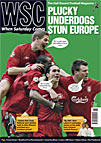 The 2004-05 season has just been more of the same old, same old. It wasn't like this years ago
The 2004-05 season has just been more of the same old, same old. It wasn't like this years ago
We are nearly at the end of another season and, as ever, for many fans it will feel like 2004-05 has been one big letdown, a year that will hard to distinguish in the memory from ten others. There may have been good moments, but they’re more than balanced by the bad. And there’s nothing wrong with that. A constant diet of unrelenting success, like a constant diet of Big Macs or a succession of evening meals spent in the company of Peter Kenyon, is no good for anyone.
But it’s none the less nice to have expectations: to begin the season with a faint stirring, for supporters of top division clubs, that this might be your year to win a cup or maybe reach Europe; lower down, that you might have a tilt at promotion or a cup run. But for the majority of English fans expectations are narrowing with each year of the 21st century. When Liverpool were dominating the League for roughly a decade from the mid-1970s they would often have the title wrapped up a month in advance (in 1982-83, they took only two points from their last seven games, yet were champions by 11 points). But while they often dominated in a manner akin to a secret police team in a Soviet Bloc country (such as in 1978-79, when their goals for and against were 85 and 16), below them it was wide open.
In their nine championships between 1973 and 1986, a different team finished second each year, including Watford and Southampton, while 15 different clubs finished in the top four and only near the beginning (1974) and at the end (1986) did Liverpool win the FA Cup, which meant almost as much as the title in those days. Sunderland, West Ham, Southampton, Manchester United, Ipswich, Arsenal, Spurs and Everton all did the Wembley lap of honour.
In 2005, by contrast, the top three were exactly as predicted at the start of this season – and at the end of last season, too, with just the precise order to sort out across nine months. The only point of unpredictability at the right end of the table is the identity of the team(s) challenging Liverpool to be the best of the rest – Everton and Bolton, rather than the almost unanimous pundits’ prediction, Newcastle. Aston Villa (in 1996) and Leeds are the only other teams to have been in the top four in a decade. Everton, at time of writing, are just about hanging on to fourth, but their points total is set to be nearer to that of the bottom club than that of Chelsea and there is no guarantee that they would qualify for the Champions League group stage (Newcastle and Rangers in recent seasons have both been knocked out at the preliminary round against Eastern European opposition).
Manchester United and Arsenal may this month be meeting in the FA Cup final for the first time since 1979, but one of them, Liverpool or Chelsea will have won it in 13 out of 14 seasons; their semi-final victories this year were widely seen as among the most one-sided in living memory, even in comparison to years when clubs outside the top division have reached the last four.
At the bottom of the table, all three promoted clubs could yet go down, a repeat of 1997-98. But in 20 seasons from 1975-76, only nine of the 60 promoted clubs went straight down and never more than one in a year. Suddenly it counts as a surprise if two sides stay up and what greater successes there have been – Ipswich finishing fifth in 2001 stands almost alone – are usually quickly dissipated.
Supporters of teams below the Premiership are spared such numbing predictability – “big” clubs can still struggle (relegated Forest were only one game away from a play-off final two seasons ago; newly demoted Leicester and Wolves were among the favourites to go up but spent the majority of the season in the bottom half); the play-offs offer hope well down the table – look at Crystal Palace last season, from 18th in December to Cardiff and promotion.
But whichever side emulates Iain Dowie’s at the end of this month can expect nothing better than nine months of grim slogging in pursuit of the 40 or so points that will guarantee the same experience for another year. (Of course another sign of the increasing divide is that suddenly 40 points may be far more than you need – a year ago all three
relegated sides finished on 33.)
Society in general often yearns for mythical golden ages and, as we have reflected in looking back last month and this on the 20th anniversary of Heysel and Bradford, there are aspects of the past that mean we would never want to go back to the 1970s and 1980s. But back then there was plenty of hope that things could get better. The well of hope has not run dry yet, but there may well be a need for a hosepipe ban this summer.
From WSC 220 June 2005. What was happening this month